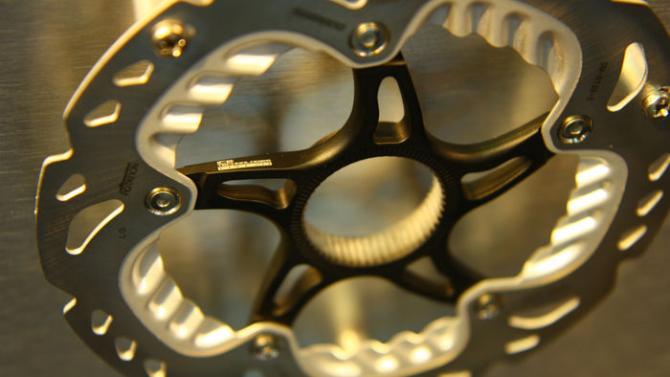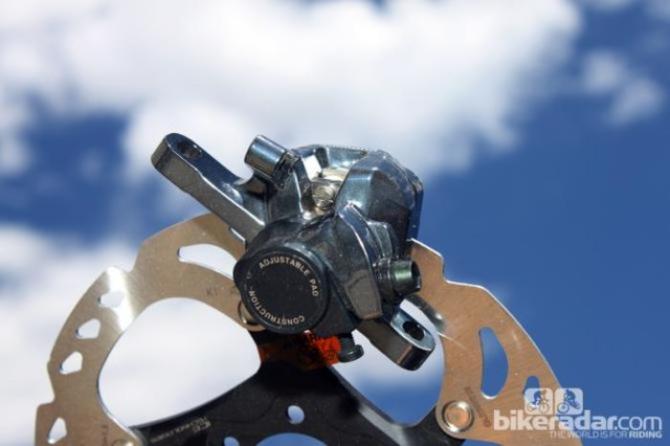The problem with disc brakes in road racing is…
Pro teams talk to BikeRadar about disc brakes in competition



This article first appeared on BikeRadar.
At the 2013 Eurobike, Shimano advertised its new road hydraulic brakes with an image of four pros looking yearningly at the system of calipers, rotors and hoses stowed behind glass – out of reach and certainly impermissible for use in their day jobs. How professional riders and their support staff felt about discs, of course, wasn't or isn't that black and white. At the Tour of Turkey going on this week, BikeRadar spoke with several teams about their thoughts on the matter.
'Have what the Pros can't have,' the posters read, and, at the time, it neatly illustrated the tension between cycling's governing body, the UCI, and manufacturers over the issue. The technology is right here, said Shimano's subtext, but you won't allow it at the top level of the sport.
That was more than nine months ago and today, the situation is very different. There's a new guard at the UCI, led by incoming president Brian Cookson. He hired Dimitris Katsanis, who developed Team GB's formidable Olympic track bikes as a technical consultant. Together, they've made a point of saying they want to re-introduce innovation to the sport, which has been music to the manufacturers' ears who believe the UCI has been a road block to technical development for years.
As we reported in March, a decision on whether disc brakes could be permitted in elite races could be made in as little as six months. At the end of April, the UCI held a two-day technical committee meeting with brand and team representatives, and one item on the agenda is road disc brakes (RDBs).
But despite the working relationship between the UCI and the brands being as good as it ever has been, there are some serious issues that need to be ironed out.
For instance, if you speak to interested parties around the pro circuit – the mechanics, technical managers and even team liaison managers (the brand guys who hook up teams with sponsored kit) – enthusiasm about RDBs is decidedly lukewarm.
The latest race content, interviews, features, reviews and expert buying guides, direct to your inbox!
"In general we know they're coming but especially here at the team now, even if the UCI introduces the rule… to convince the teams is much, much more difficult," Stefan Christ, head of development at BMC, told BikeRadar.
Are we compatible?
For Christ and many others, the issue revolves around compatibility, which is bound to be raised at the technical meeting.
"The whole wheel-change problem; that needs to be sewn up," Christ said. "There are question marks about disc size and components," he added. The implication is that in the travelling cauldron of a road race, disc brakes add a headache to the relatively simple process of changing a flat. Right now, a neutral service mechanic needs two simple pieces of information to get a rider on the way again: is it SRAM/Shimano or Campagnolo? And is it 10- or 11-speed? That's about it. The extra layer of complexity RDB's would bring could mean slower wheel changes – and that could start influencing race results.
At the Tour of Turkey, Lotto-Belisol team mechanic Geert Rombauts, who also works on the cyclocross circuit in winter, echoed Christ's compatibility concerns.
"For us as mechanics it's going to be a little harder to make a wheel change," Rombauts said. "And even now the news that I heard is that on a long downhill the discs are heating up, so you have to go to big discs – like 180mm – and then it's going to be a little bit more difficult because the discs are not always straight. Maybe they're working on it."
"If we're going to use a 140mm disc, maybe other teams are going to use a 160mm, 180mm disc and then it's going to be a mess up with all these different disc sizes," Rombauts said.
Disc size is one thing, axle standards are another quandary. There'll be at least one bike brand with thru-axle disc road bikes at Eurobike this year, but currently, most wheels makers are still on QR skewers.
Chris D'Aluisio, director of advanced research at Specialized, admitted that the extra complexity of RDBs had also worried his sponsored teams.
"I called our teams and equipment managers last year and they were all pretty afraid of the complexity – the bleeding, the storage, the usage, the compatibility and the wheel changes," he explained. "It basically comes down to compatibility issues on the road. In the Pro Tour, if you add in disc brakes the number of wheels, rotor size and axle styles just goes crazy - and that's just within one team."
Freinage a deux vitesses? (Braking at two speeds?)
At German bike brand Canyon, sponsor of professional teams Movistar and Katusha, the brand's team liaison manager, Andreas Walzer had his own, more rider-orientated concerns over RDBs: a longstanding worry over the mixing of disc and rim brake systems in a single peloton.
"If you start, everybody has to use disc brakes otherwise its very dangerous," he pointed out. "You have two kinds of standard in braking if it's wet and downhill. Imagine what would happen in the downhill in the Tour or Giro?"
Walzer also voiced concerns about races where RDB-equipped pros mix with young riders and amateurs.
Currently only Shimano offer a user-ready system, though SRAM is close and Campagnolo should announce details of a system soon. That will partially mitigate concern over all pros having availability – a key concern of Katsanis – but doesn't resolve the thorny issue of the pro/amateur split.
Carsten Jeppesen, Team Sky's head of technical operations, brought up another potential issue with disc brakes — pile-ups involving hot rotors.
"The disc gets warm and in crash could you protect the rotor somehow?" Jeppesen said. "You have to look at that because if it's warm and sharp as a knife it's dangerous."
However Jeppesen doesn't believe current reservations about RDBs will hold up the system entirely. "You can't stop moving forward, you can't stop the industry and the fans – that's what they want and it's what we want," Jeppesen concluded.
Despite reticence on the peloton's fringes, nobody BikeRadar spoke to thinks road disc brakes won't appear in the peloton at some point. The decision no longer appears to be a question of if but rather when. For one thing, as Christ at BMC pointed out, RDB's arrival will be the biggest technological advancement since electronic gearing was introduced. "All the manufacturers want it," he said.
So before talk about rotors, slave cylinders and bleeding become common parlance among pro bike mechanics, there are serious hurdles to overcome and reservations to dissolve. But in the current climate where cooperation and goodwill between UCI manufacturers and teams is at an all-time high, there's no doubting the will to resolve the issue.
Sam started as a trainee reporter on daily newspapers in the UK before moving to South Africa where he contributed to national cycling magazine Ride for three years. After moving back to the UK he joined Procycling as a staff writer in November 2010.